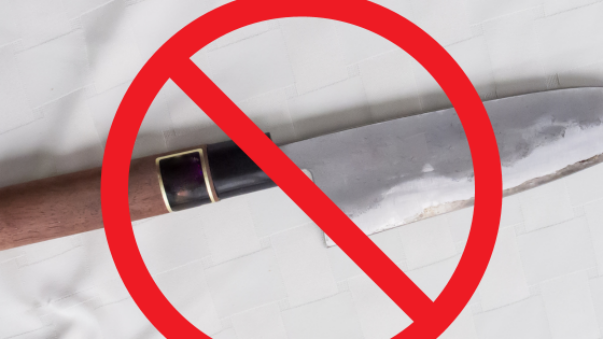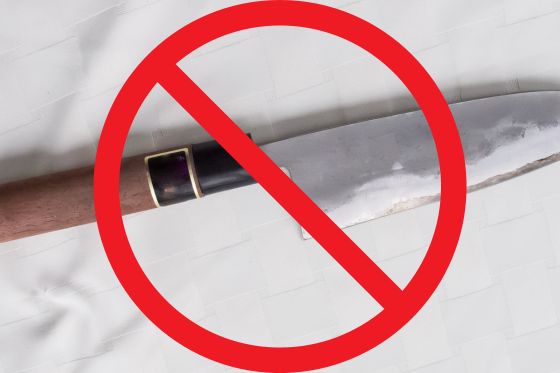
November 29, 2023
Court Persuaded Not to Give a Prison Sentence for Possession of a Knife

Hill Twine Solicitors was instructed on a private basis to represent CA. He pleaded guilty to possessing a bladed article (a knife) in a public place. The circumstances of the offence were such that he was at significant risk of a custodial sentence. He accepted that he threatened to slash his ex-partner's tyres with the knife. The starting point on the Sentencing Guidelines was 6 months' imprisonment. He was represented at court by Sarah Hill, who successfully persuaded the judge to depart from the sentencing guidelines and impose a non-custodial sentence.
Our client, CA, was charged with possession of a bladed article in a public place following a sensitive argument with his ex-partner that escalated. They were parents to a young child and managing the child contact arrangements between them following the breakdown of their relationship. On the day in question they got into argument, during which she threatened to take the child away from him. This caused CA a significant amount of upset and he looked for a way to prevent her leaving with the child. In the heat of the moment, he threatened to slash her car tyres to prevent her from leaving, picked up a kitchen knife and went out to the street where her car was parked. The incident was caught on video. He did not carry out the threat and the incident calmed down.
CA was arrested by the police and interviewed about this incident. Hill Twine Solicitors was rota’d as the duty solicitors on the date in question and, upon CA asking to speak to the duty solicitor, the case was allocated to us. Luke Naveira represented the client at the police station. He took full instructions on this matter and advised CA on how to deal with the interview, having analysed the evidence in the case and considered how the police were most likely to deal with this case. The police decided to deal with the case in a different way to that indicated to Luke and CA was charged with the offence of possession of a bladed article in a public place.
CA appeared before Poole Magistrates’ Court, where he was represented by Sarah Hill. Much to his credit, CA was extremely remorseful for his actions. He had acted in the heat of the moment, upon his ex-partner threatening to take his child away and stop contact between them. He considered damaging the tyres on his ex-partner’s car with a kitchen knife as a means of stopping her leaving with their child. He acted under the mistaken belief that, because he had purchased the tyres, they belonged to him and he could do what he liked to them.
Sarah reviewed all of the evidence in the case, including a prosecution video showing the client making threats whilst holding the kitchen knife. Her advice to the client regarding plea was based on his instructions and the strength of the prosecution case. CA entered a guilty plea to the offence of possession of a bladed article in a public place.
The sentencing starting point was an 18-month prison sentence, with the sentence range being from 1 year to 2.5 years imprisonment
Criminal courts use Sentencing Guidelines to help decide on the most appropriate sentence to pass. Following the Guidelines is mandatory in the magistrates’ court, unless it is in the interests of justice to depart from the recommended sentence. Due to the significant public concern regarding the carrying of knives in public, the guideline for possession of a bladed article has strengthened over the years. When applied to the facts of this particular case, the sentencing starting point in the guidelines was an 18 month prison sentence, with the sentence range being from 1 year to 2.5 years imprisonment.
Upon CA entering a guilty plea, it fell to Sarah to try to persuade the District Judge to depart from the Sentencing Guidelines to avoid the client receiving a custodial sentence. Sarah had spent some time with CA before the hearing taking his instructions on the case. She was able to understand a significant amount about his background, his current circumstances, and what led to the commission of this offence.
Sarah made a full plea in mitigation to the judge. A ‘plea in mitigation’ is the opportunity for the Defence to give the Court a much more informed picture of the defendant. Bearing in mind that the Court hears the prosecution case first, its first impression of a defendant is usually very poor. It is given only a snapshot of the defendant, that being the facts surrounding the commission of the offence and the record of previous convictions (if there are any). A plea in mitigation made expertly and sensitively enables the Court to adapt its first impression of a defendant. Done well, it adds a lot of colour to what is initially a black and white picture.
In this case, Sarah provided the judge with what he needed to know about the client to understand the circumstances of the offence from his perspective. In particular, she applied the facts and mitigation to the sentencing guidelines and was able to persuade the judge to re-categorise the offence, departing from a starting point of 18 months’ imprisonment, to one of 6 months’ imprisonment. The case was adjourned for the client to speak to a Probation Officer to facilitate the preparation of a pre-sentence report (PSR). A PSR enables the Court to learn more about a defendant and the possible sentencing options open to it, beyond immediate imprisonment.
As a result of Sarah’s plea in mitigation, the judge agreed this was a rare case in which he could depart from the sentencing guidelines and pass a non-custodial sentence
When the Court returned to sentence CA, it had before it a very positive PSR. The judge heard a little more mitigation from Sarah before passing sentence. As a result of Sarah’s plea in mitigation, the judge agreed this was a rare case in which he could depart from the sentencing guidelines. Due to the seriousness of possession of bladed article offences, courts rarely impose a non-custodial sentence. In this case, however, the judge agreed to impose a community order with the client ordered to do 100 hours unpaid work. He had particular regard to the client’s early guilty plea and his heartfelt remorse.
CA was extremely pleased with the outcome and felt it truly reflected the circumstances of the offence. He was very grateful to both Sarah and Luke for the quality of representation he had received from Hill Twine Solicitors.

November 29, 2023
Court Persuaded Not to Give a Prison Sentence for Possession of a Knife

November 29, 2023
Client Acquitted of Road Rage Offences after CPS Drop Case

October 2, 2023
Philomena Murphy Successfully Persuades CPS to Drop Assault Case

September 15, 2023
Luke Naveira Commences a Solicitor Apprenticeship to Qualify as a Solicitor

July 27, 2023
Not Guilty Verdict Secured by Guy Gosheron in Assault by Beating Case

March 3, 2023
Sarah Hill Secures Excellent Outcome for Client in Drink Driving Case
If you have any questions or need advice